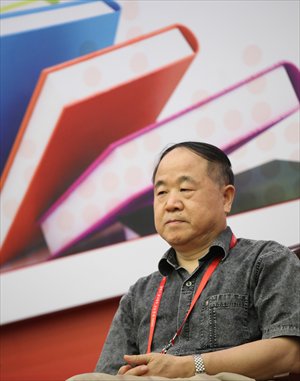Mo’s Nobel allows writers to dream

Mo Yan said after he won the Nobel Prize in Literature that he hoped this award would not spark a rush for his works at a press conference Saturday. But the reality may have surpassed even his expectations.
China's book market has witnessed booming sales of Mo's books over the past few days. Many bookstores across the country found they had sold out of Mo's works, which drove many to turn to libraries to get a taste of this Nobel-winner's literary talent.
The event not only aroused public interest in Mo Yan's works, but also drew cheers from across literary circles, as Mo's win helped raise the profile of Chinese literature globally.
International recognition
The prize indicates that Chinese contemporary authors and their works are getting a measure of international acclaim, prompting professional and amateurs writers alike to continue their pursuit, said Wang Meng, a renowned Chinese writer.
But "the prize came a little late," said Xue Yongwu, dean of the College of Liberal Arts, Journalism and Communication with Ocean University of China (OUC).
There have been many accomplished writers of modern and contemporary literature in China, including Lu Xun, Ba Jin and Mao Dun, many of who should have won the prize earlier, he noted.
China's ancient literature, which extends back thousands of years, has been widely acknowledged. However, its contemporary literature has failed to get enough recognition from outside the country due to its short history and complex political influences, Xue explained.
Language has also been a barrier. Only a small proportion of Chinese literature has been translated into foreign languages, mainly English. The quality of some translated editions also needs improvement, said Xue.
In addition to linguistic skills, translation requires high-level comprehension and interpretation of culture and art. It is hard for people without any literary background to produce a translation that fully reserves the aesthetic sense of the original version, according to Ren Dongsheng, professor with the College of Foreign Languages of OUC.
However, "a Nobel Prize is not the sole standard for judging the achievements of a writer. Prizes presented by different organizations adopt various evaluation criteria," said Xu Yan, a literature critic. The quality of a literary work is usually judged by the subject matter, language, structure, the manner of story-telling, imagination and other significant elements. People's tastes vary widely amid different social backgrounds and cultures, she added.
Hallucinatory realism
Mo, 57, is known for his depiction of Chinese rural life. The settings for his works range from the 1911 revolution and Japan's invasion (1937-45), to the Cultural Revolution (1966-76).
Mo combines hallucinatory realism with folk tales, which is more appealing to the taste of Western readers than the styles adopted by many of his peers, such as Yu Hua, Su Tong and Wang Shuo, said Zhang Hongsheng, dean of the Literature Department of the Communication University of China.
Hallucinatory realism was introduced to China over 30 years ago when a large number of translations of Latin American literature and studies were made, which wielded a great influence on Chinese contemporary literature. Chinese writers including Mo Yan, Yan Lianke and Ke Fei all held that Chinese writers should drew a lot of inspiration from these works.
Mo has now made hallucinatory realism a hot topic in Chinese literature circles once again. Li Xing, a literary critic, told Sanqin Daily that Latin America, the origin of hallucinatory realism, is a developing region like China and that both its countries and China have a rich traditional and folk culture tinged in mystery.
To Li, fictional works themed along the lines of hallucinatory realism, though appearing mysterious, often contain a deep analysis of modern society and human nature. But he worried that the theme of hallucinatory realism might be misused after Mo won the prize. "Mysterious and magical things cannot be wantonly enhanced unless it closely integrates with the work."
Contemporary prospects
Chinese contemporary literature, which has fully emerged only since 1949, has diversified since the country adopted the market economy in late 1970s.
"The prize is a positive sign that the West has begun to recognize Chinese literature. But it's an acknowledgement of individual efforts, and the Chinese literary revival still has a long way to go," said Zhang.
Xue called upon Chinese writers to produce quality works with international perspectives. Good literature should reveal social problems and people's concerns while create the beauty of art. "The society should provide favorable environment for the growth of Chinese writers," he stressed.
Seeking increasing world attention requires Chinese writers to maintain the national characteristics and uniqueness. "Chinese elements are the last to lose in successful writings," Zhang said.
The book market in China has witnessed booming sales of Mo's works. Zhicheng Classic Bookstore, registered at T-Mall of China's largest online retailer taobao.com, said 1,500 copies of Mo's latest novel Frogs were sold out in six hours after Mo won the prize. The store has received 1,200 reservation orders by 3:30 pm Friday.
The book, about China's family planning policy, also moved up to 14th from 560th on the list of bestsellers on amazon.cn within two days.
Jin Renshun, a female writer from Jilin Province, told the Global Times that though Mo's win may not single-handedly lead to a rush for Chinese contemporary literature, it will raise prospects for the country's writers.